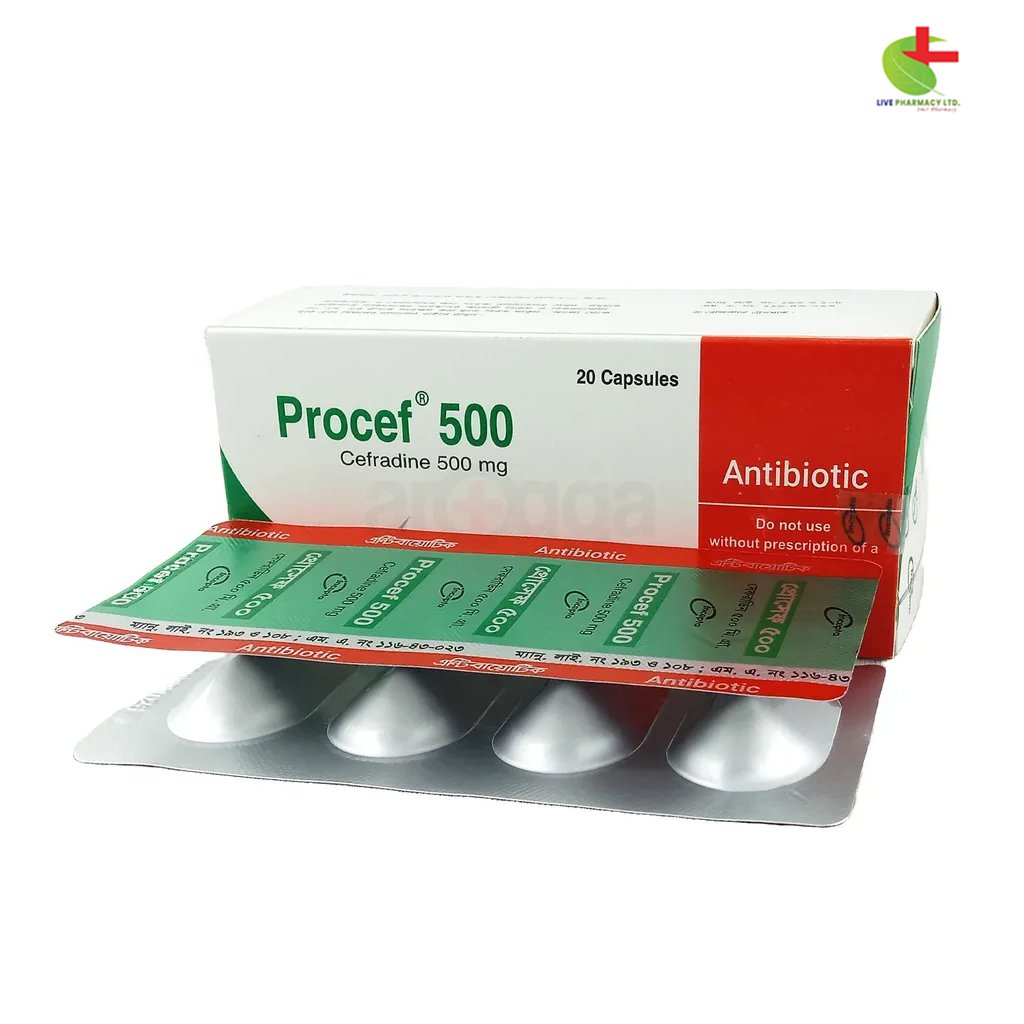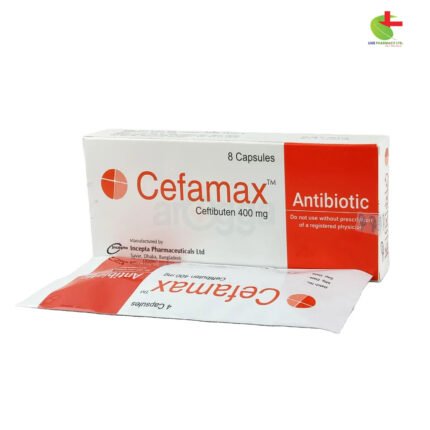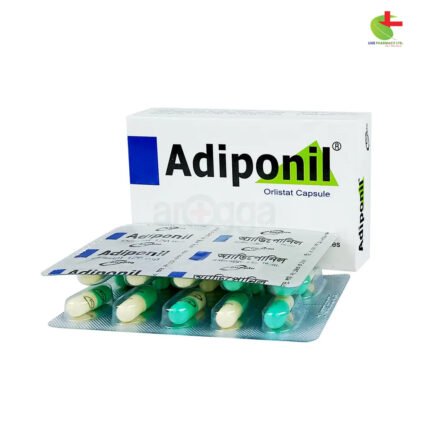Procef 500
60.00৳ Strip
- Procef is a broad-spectrum antibiotic containing Cephradine.
- Effective against various infections caused by Gram-positive and Gram-negative bacteria.
- Indicated for upper and lower respiratory tract infections, urinary tract infections, and skin infections.
- Works by inhibiting bacterial cell wall synthesis, leading to cell lysis.
- Available in oral and injectable forms; should be used under medical supervision for safety and efficacy.
 Brand
Brand
|
Incepta Pharmaceuticals Ltd |
|---|---|
 Generics
Generics
|
Cephradine |
 Type
Type
|
Capsule |
Indications
Procef is indicated for treating infections caused by susceptible Gram-positive and Gram-negative bacteria, including:
- Upper Respiratory Tract Infections: Sinusitis, pharyngitis, tonsillitis, laryngo-tracheobronchitis, and otitis media.
- Lower Respiratory Tract Infections: Both acute and chronic bronchitis, lobar pneumonia, and bronchopneumonia.
- Urinary Tract Infections: Cystitis, urethritis, and pyelonephritis.
- Skin and Soft Tissue Infections: Abscesses, cellulitis, furunculosis, and impetigo.
Procef effectively targets the following microorganisms:
- Gram-positive: Includes both penicillin-sensitive and resistant strains of Staphylococci, Streptococci, and Streptococcus pneumoniae.
- Gram-negative: Effective against Escherichia coli, Klebsiella spp, Proteus mirabilis, Haemophilus influenzae, Shigella spp, Salmonella spp (including Salmonella typhi), and Neisseria spp. Notably, many E. coli and Staphylococcus aureus strains resistant to ampicillin are susceptible to Procef.
Pharmacology
Cephradine, the active ingredient in Procef, is a semi-synthetic, broad-spectrum bactericidal antibiotic effective against both Gram-positive and Gram-negative bacteria. It targets the bacterial cell wall, inhibiting its synthesis, which leads to cell lysis.
Dosage & Administration
For Oral Administration:
- Adults:
- Urinary Tract Infections: 500 mg four times daily or 1 g twice daily. Higher doses may be necessary for severe cases.
- Respiratory Tract Infections: 250 to 500 mg four times daily or 500 mg to 1 g twice daily.
- Skin Infections: 250 to 500 mg four times daily or 500 mg to 1 g twice daily.
- Children:
- Total daily dose of 25 to 50 mg/kg in divided doses.
- Otitis Media: 75 to 100 mg/kg daily in divided doses every 6 to 12 hours.
- Maximum daily dosage: 4 g.
- Elderly: Normal adult dose is appropriate. Monitor renal or hepatic function.
For Injectable Administration:
- Adults: 2-4 g daily in four divided doses, up to 8 g daily. Prophylactic doses of 1-2 g can be administered preoperatively.
- Children: 50-100 mg/kg daily in four divided doses, with a maximum of 300 mg/kg daily for severe infections.
Always follow your doctor’s guidance when using this medication.
Interactions
Combining Procef with nephrotoxic drugs like aminoglycosides may increase the risk of kidney damage. Diuretics and probenecid can enhance renal toxicity.
Contraindications
Procef should not be used in patients with known hypersensitivity to cephalosporins.
Side Effects
Common side effects may include gastrointestinal disturbances and hypersensitivity reactions, especially in those with a history of allergies. Rare effects can include glossitis, dizziness, and skin reactions.
Pregnancy & Lactation
Safety in pregnancy is not established, and caution is advised when breastfeeding, as Cephradine is excreted in milk.
Precautions & Warnings
- Prolonged use may lead to superinfections due to resistant organisms.
- Use with caution in patients sensitive to penicillins due to potential cross-reactivity.
- May yield false-positive results in glucose urine tests.
Use in Special Populations
Renal Impairment: Dose adjustments are recommended based on renal function.
Additional Information: Higher doses may be needed for severe infections, and treatment should continue for at least 2-3 days after symptoms resolve.
Overdose Effects
Overdose symptoms are nonspecific, including nausea and vomiting. Supportive treatment is essential, and gastric lavage may be necessary for significant ingestion.
Therapeutic Class
First-generation cephalosporins.
Storage Conditions
Procef suspension should be freshly prepared and used within 7 days at room temperature or 14 days when refrigerated. Injection solutions should be used within 2 hours at room temperature. Store out of reach of children and only dispense with a physician’s prescription.













Reviews
There are no reviews yet.